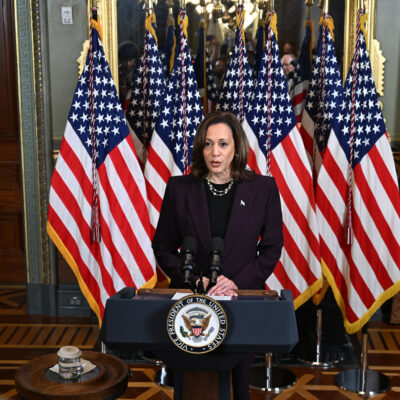In Michigan, Democrats walk fine line on Israel between dueling constituencies
A state critical to Democrats’ House and Senate ambitions has become an epicenter of Israel policy debates

Bill Pugliano/Getty Images
Rep. Elissa Slotkin (D-MI) campaigns with Rep. Liz Cheney (R-WY) at an Evening for Patriotism and Bipartisanship event on November 1, 2022, in East Lansing, Michigan.
President Joe Biden is scheduled to visit Michigan on Thursday — a state that has in recent months become an epicenter of his party’s divisions over Israel. In the lead-up to his trip, the Biden reelection campaign has worked to shore up support within the state’s sizable Arab and Muslim voters, as some organizers in the community rally behind calls to sit out the 2024 election.
Michigan — which also has a significant Jewish community and an influential moderate suburban voting base — is also likely to be critical to Democrats’ hopes of retaining control of the Senate and retaking the House, with an open Senate seat and several key competitive House seats.
Rep. Elissa Slotkin (D-MI), a pro-Israel Jewish Democrat running for Michigan’s Senate seat, has grown more critical of Israel’s military operation in recent weeks, joining a letter with fellow Democrats with national security backgrounds calling for the administration to pressure Israel to make a “significant” shift in its practices in Gaza.
The letter risks costing her support with both core constituencies — Jewish voters who could be frustrated that she’s taking a tougher line against Israel than Biden, and Muslim voters who are unequivocally anti-Israel. In October, Slotkin met with leaders from an Islamic center in her district that blamed Israel for Hamas’ terror attack.
David Kramer, who serves as finance chair for Slotkin’s campaign, told Jewish Insider earlier this month he doesn’t think that the letter was motivated by political considerations.
“She comes at everything from a pretty authentic place,” he said, highlighting Slotkin’s national security background and knowledge on the subject. “I know that the statements she’s put out have been ones that she feels strongly about, not just putting her finger in the wind and saying, ‘What’s the politically expedient way to chart the course and make everybody happy, or nobody unhappy?’”
Kramer said he’s “hopeful” that Slotkin’s long-standing relationships with the Arab community in the state will motivate those voters to turn out even if they disagree with her policy on Israel — “but time will tell.”
But if Republicans nominate a mainstream candidate, such as former House Intelligence Committee Chairman Mike Rogers (R-MI), who is running for the seat, Slotkin could find herself in for a tougher challenge than anticipated.
Adrian Hemond, a Michigan political strategist, told JI that recent polling shows that Slotkin’s support for Israel isn’t making a significant dent in her polling numbers at this stage — she’s well ahead of a more progressive primary opponent whose platform includes calls for a cease-fire.
Hemond said he’s skeptical that the issue will sap significant support from Slotkin and Democrats statewide.
“Arab Americans in Michigan are fairly low propensity voters anyway,” he said. “The more mainstream Democrats are more regular voters,” he continued, noting that key suburban populations that have realigned toward Democrats in recent cycles are “the people who are least sympathetic to the ‘Ceasefire Now’ position.”
Democrats are also hoping this cycle to hang onto several competitive House districts in the state, including the 7th District, currently held by Slotkin, and the 8th District, held by retiring Rep. Dan Kildee (D-MI).
Although the state’s most progressive voters and its Arab and Muslim population are concentrated elsewhere in the state, in and around Dearborn, the Middle East conflict could have some impact on these races.
In Slotkin’s 2022 race, Kramer noted, Michigan State University students in the capital of Lansing were a key constituency and a major focus for Slotkin. While the school has not been at the forefront of anti-Israel activism to the same extent as other campuses, the school has seen its share of such organizing.
“How big of a concern is this issue for voting students at Michigan State? I don’t know,” Kramer said. “I would imagine that it is an issue for some.”
Curtis Hertel, the former state senator who is the Democratic front-runner for the 7th District seat, has expressed pro-Israel views, and generally falls into a similar pragmatic mold as Slotkin.
He told JI that anti-Israel organizing in the state won’t dissuade him from his pro-Israel views, emphasizing the need to “do what you think is right.” But he also said he’ll continue to have conversations with others in the community who disagree with him on the subject.
In the Kildee district, there’s some concern in the pro-Israel community about Democratic candidate Pamela Pugh, a member of the state Board of Education who has pushed for a cease-fire between Israel and Hamas.
Another serious candidate in that race, state Sen. Kristen McDonald Rivet, is more eager to work and partner with the Jewish community on this issue, Kramer said, predicting that she’ll win the primary by a comfortable margin.









